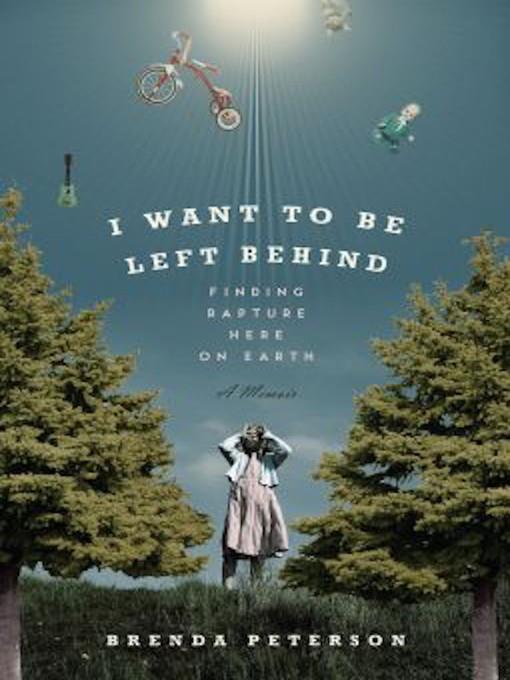
I Want to Be Left Behind
Finding Rapture Here on Earth
کتاب های مرتبط
- اطلاعات
- نقد و بررسی
- دیدگاه کاربران
نقد و بررسی

January 11, 2010
Talk of the rapture—the ascent to heaven of true Christians before the end of the world—surrounds Peterson (Duck and Cover
), and she engages this conversation with delicacy, humor, frustration, and, at times, a begrudging respect, in this memoir about growing up among Southern Baptists and not quite fitting in. Peterson’s story is told through what is really a series of vignettes, tied together by two themes, faith and the environment. She looks back at her childhood, college, and then adulthood, stopping here and there, selecting scenes from her life that show why she finds God outdoors, and why the rapture-obsessed family and community of her youth quickly loses its appeal. Her love for this world and everything in it is far greater than any promise of salvation apart from and above it. Readers interested in a story about leaving behind theologically conservative Christianity and other types of extremism will find Peterson’s collection of anecdotes and remembered conversations engaging. The chapters can be read on their own, and her prologue, “The Trumpet Shall Sound,” and chapter “In the Garden” are among the best.

December 1, 2009
An environmentalist writer's lifelong struggle with her evangelical roots.
Given her career of writing passionately about nature and her ecological activism, one might think that Peterson (Animal Heart, 2004, etc.) was reared in a family of liberal environmentalists. In fact, her household was just the opposite: fundamentalist, Southern Baptist, and evangelical to the core. She began to doubt her place in God's Christian army from a young age, when her pensive questions about animals' souls and the afterlife got her kicked out of Sunday School and regularly rebuked at the family dinner table. She could never come to terms with the way that Christian fundamentalists, who considered themselves"in this world but not of it," could fixate on a future in heaven while disregarding the beauty and fragility here on earth. This dangerous backwardness was most appalling in her father, who eventually headed of the U.S. Forestry Service. It wasn't until well after college, newly recovered from a harrowing stint as an editorial staffer at the New Yorker, that Peterson learned to hold her own with her boisterous, highly conservative relatives. After years spent on the West Coast among liberals supposedly more like herself, Peterson began to recognize parallels between the rigid fundamentalism of End Times evangelists and the doomsday environmentalist camp. Both dwelled on the negative and used fear of annihilation as their main conversion tactic, and neither could satisfy her longing for a spiritual home in the natural world. By keeping the thread of her theme running consistently throughout the book, the author offers a selective memoir that blends her unique autobiography with compassionate and levelheaded observations about family, food, religion, life and our relationships with living things.
Whether rabble-rousing at Baptist summer camp or guarding seal pups by the Salish Sea, Peterson has a gift for describing her life's many adventures with disarming understatement and narrative poise.
(COPYRIGHT (2009) KIRKUS REVIEWS/NIELSEN BUSINESS MEDIA, INC. ALL RIGHTS RESERVED.)

Starred review from December 1, 2009
Peterson has been sharpening her ethos on the flinty tenets of the Southern Baptist Church ever since she was an inquisitive child enthralled by the living world. Following her fourth novel, Animal Heart (2004), she continues the inquiry into her complex heritage and ecological calling that she began in Build Me an Ark (2001). In this unusually affecting and radiant spiritual memoir, Peterson recounts her resistance to End Times teachings. Surely, life on earth is sacred, thought this increasingly mutinous mystic alert to the contradictions between her parents heaven-focused religion and her CIA-employed mothers earthiness and her gifted fathers devotion to nature as chief of the U.S. Forest Service. With stirring immediacy, Peterson describes the traumatic awakenings during the 1960s and 1970s that inspired her to reject the concept of the Rapture and embrace the effort to preserve earthly creation. Guided by exceptional mentors, Peterson endured experiences painful, ludicrous, and profound in small towns, a boot camp for Southern Baptists, and the offices of the New Yorker before finding her true home on the Pacific coast. Frankly and knowledgeably critiquing evangelicalism and holier-than-thou environmentalism, Peterson seeks a meeting of church and earth in this witty, enrapturing account of a spiritual journey of great relevance to us all.(Reprinted with permission of Booklist, copyright 2009, American Library Association.)

























دیدگاه کاربران